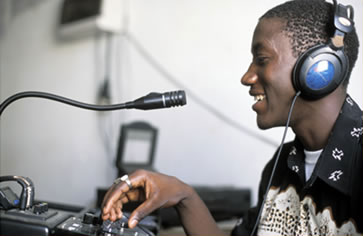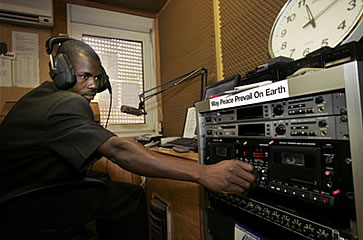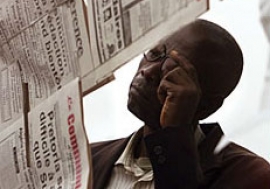Broadcasting peace: radio a tool for recovery
Broadcasting peace: radio a tool for recovery
 Radio can be a powerful medium for spreading misinformation and insecurity—and for building peace.
Radio can be a powerful medium for spreading misinformation and insecurity—and for building peace.Mega FM’s broadcasts may not reach far outside northern Uganda. But in an area that has been brutalized by decades of insurgency by the Lord’s Resistance Army (LRA), it is having an impact. Oryema, a former LRA child soldier who later returned home, explains why. “I did not feel anything bad about killing,” he says. “Not until I started listening to Radio Mega…. I actually heard over the radio how...we burnt homes…. And I started to think, ‘Are we really fighting a normal war?’ That is when I started realizing that maybe there is something better than being here in the bush.”
According to Mr. Boniface Ojok of the non-profit project Justice and Reconciliation, located in Gulu, northern Uganda, Mega FM’s programme “Dwog cen paco” (come back home) “succeeded in encouraging rebels to come out of the bush.” The programme brought former soldiers like Oryema on the air to talk about their experiences.
Funded by the UK’s Department for International Development (DfID), Mega FM is one of several such stations that have been set up in Africa by the United Nations, donor agencies, churches and non-governmental organizations (NGOs) to help communities overcome the challenges of rebuilding peace after wars have ended.
 UNAMSIL Radio in Sierra Leone: Finding the resources to maintain such stations after UN peacekeeping missions have ended is a major challenge.
UNAMSIL Radio in Sierra Leone: Finding the resources to maintain such stations after UN peacekeeping missions have ended is a major challenge.Rights and law
Southwest of Uganda is Ituri, in the eastern Democratic Republic of the Congo (DRC), where thousands were killed during the country’s civil war. There another project, called the Interactive Radio for Justice (IRFJ), seeks to raise public awareness of human rights and the options for dealing with crimes during and after the war.
Set up in June 2005 with funding from the US philanthropic MacArthur Foundation, the IRFJ produces programmes in which members of the public pose questions and get answers from local and international officials. The goal is not just to inform the public, says producer Wanda Hall. “The project allows us to push authorities to do their job. Local leaders know what their job is. They know the law and their role. Our job is to get them to say these things on the radio so that the population knows what their rights are.”
According to Congolese journalist and IRFJ co-producer Richard Pituwa, the project’s programmes are intended to help people understand local and international law. Comparing the current situation to the period before the project came to Ituri, he told Africa Renewal that he saw a marked change in the “police’s approach to people and people being more observant of the law.”
According to one participant in an October 2006 listeners’ poll, “We are starting to understand our rights, and even the police have stopped arresting us arbitrarily.” Said another: “These programmes are very important for justice and peace to return.… It would have been better to have programmes like this on the air before the war.”
Not a luxury
In West Africa, the NGO Search for Common Ground (SFCG) produces and airs programmes on peace, disarmament and reconciliation in Liberia, using 22 partner radio stations —10 in the capital, Monrovia, and 12 in rural communities. In 2004, when the office of the UN High Commissioner for Refugees needed to repatriate 340,000 Liberians from neighbouring countries, the SFCG developed a programme with UN updates, news on the peace process and information on safe areas.
Similar programmes produced by SFCG’s Talking Drum Studio are still being aired in neighbouring Sierra Leone, which has also been recovering from war. Mr. Christopher John, then regional commissioner for the Sierra Leone Police (SLP), told independent evaluators in 2004 that the SFCG’s programming “has helped the SLP become even critical of itself.… It helped the police draw closer to the people and build confidence and trust.” Such efforts, he added, “need to be sustained if we are to be successful in consolidating peace.”
Similar stations seeking to promote peace include UNAMSIL Radio, set up by the UN peacekeeping mission in Sierra Leone, and Radio Okapi in the DRC, jointly run by the UN peacekeeping mission there and the Swiss foundation Hirondelle.
UN peace missions have been setting up such radio programmes in post-conflict countries since the 1980s. In areas where ethnic and political factions have incited hate or spread propaganda, UN-run stations have sought to counteract the messages of such broadcasts, especially after extremist leaders used radio in the early 1990s to fan ethnic hatred and incite genocide in Rwanda and the former Yugoslavia.
Radio Okapi has been credited by regional analysts with easing tensions, counteracting propaganda, and helping people in eastern Congo rebuild their lives after war.
Mr. William Orme, a policy advisor on independent media development for the UN Development Programme (UNDP), argues that such stations are critical. “Unless you have a neutral place where accurate information and grievances can be aired, there can be a renewal of conflict. Such media is not a luxury, it is a necessity,” he says.
Alternative ideas
Ms. Frances Fortune, SFCG’s Africa director, runs radio projects in eight countries emerging from conflict, including Angola, Burundi, Sierra Leone and Liberia. “Governments are not very good at communicating to their people,” she explained to Africa Renewal. “Yet often there is so much going on during and after conflict that people need to know and understand. The role that media can play in supporting peace is immense. You can change the way a government engages. Even prevention of conflict is possible if you provide people with alternative ideas early enough.”
The UN Security Council recognized the significant impact of such media in Sierra Leone. When it decided in 2005 to wind up the UN peacekeeping mission there, it simultaneously called for the retention of “an independent and capable public radio capacity” to continue “promoting a culture of peace, dialogue and participation.” UNDP and the UN Educational, Scientific and Cultural Organization (UNESCO) are currently working together with the Hirondelle foundation and the SFCG to find a way to keep UNAMSIL Radio going. For the time being, the station is still being funded by the UN and managed by the UN Integrated Office in Sierra Leone.
Such media are important long after war, says Ms. Fortune. After conflicts, “people have huge expectations,” she argues. “There is need to manage such expectations so as to avoid a return to conflict. Many people would argue that just providing information, strictly news is adequate. That is not so. Media has to be utilized to support peace.”
Spurring action, accountability
Mr. Pituwa, whose radio station Canal Revelation helps produce and air IRFJ programmes, agrees that media can support peace building and democratic ideals. “Recently a man was beaten up by the police and his ID torn. He told us he listens to our radio programmes and knows that this is wrong. He made a complaint at the court.”
Mr. Pituwa acknowledges that not everyone who listens takes advantage of the legal options available to them, but at least the programmes helps the public “make informed decisions on exercising their rights.” Radio Canal Revelation works with local stations Radio Colombe and Radio Ocean to distribute IRFJ programmes in Swahili, Lingala, French, Kikongo and Kiluba in the DRC’s Bunia region, as well as in southern Sudan and western Uganda.
Such stations can also raise awareness of financial accountability and good governance. In Sierra Leone, local councils are required by law to post their income and expenditure statements on a public notice board. But many people are illiterate and do not understand or question how resources are used. To address that problem, the SFCG developed a programme called “Accountability Now.” Mr. James Ambrose, the head of SFCG in Sierra Leone, explained the programme to Africa Renewal: “We go with a microphone and ask the council or treasury clerk to read the account and expenditure statement, explaining what is being done and why. This allows the community to demand accountability.”
In nearby Côte d’Ivoire, a soap opera series about football players from different ethnic backgrounds is being used to enhance a sense of national identity, following that country’s civil war. Funded by the European Commission and the Skoll Foundation, a private US philanthropic organization, the series airs on 14 local radio stations, including ONUCI FM, the station of the UN peacekeeping mission. The UN also supports 10 community radio stations with similar programming, to counter the impact of negative media by the warring factions.
Risks and objections
In northern Uganda, some LRA commanders, recognizing the role of radio programmes in persuading their soldiers to give up arms, attempted to limit access to radios. They also retaliated violently, including by massacring people in the home village of an LRA commander who left the movement and spoke about his decision over the airwaves.
Such negative responses explain a common objection against such projects by mainstream media practitioners and conflict resolution experts, who argue that peace building requires specialized skills that journalists do not have.
Ms. Hall of the IRFJ agrees that many journalists may not necessarily have the appropriate skills. However, she notes that the media have been used effectively by humanitarian groups, civil society organizations, the UN and governments to “promote everything from condoms [and] mosquito nets to registering to vote.” And since warring factions have used radio “to promote hatred and violence, as in the case of Rwanda,” she adds, it is also important to “find ways to use it to support peace building and development.”
Journalists can improve their skills with relevant training and a supportive environment, argue Mark Frohardt and Jonathan Temin of Internews, an international non-profit that trains media practitioners worldwide. In a 2003 report on the use and abuse of media in vulnerable societies, they argued for providing journalists with resources (computers, salaries and vehicles) and training.
Gordon Adam of the Scotland-based NGO Media Support and Lina Holguin of Oxfam in Quebec, Canada, add that the success of such initiatives “depends on the partnerships developed between members of the media and conflict resolution specialists, NGOs, funding organizations and communities.” Such partnerships provide journalists with the knowledge they may lack and facilitate their ability “to meet the needs of the audience.”
Letting people make up their minds
Mr. Yves Laplume, the former programme director of Radio Okapi in the DRC, argues that in his experience, the most important partnership is with the public. “People need information, but do not want to be told what to think,” he told Africa Renewal. “We gave people real facts, verified facts, well sourced. We don’t add any comments. We saw in different surveys that they like it…. They want you to give them the information and let them make up their minds. It is basic, but it has a great impact.”
The experience in Sierra Leone is similar. “People think that because the audience are rural people they are not sophisticated, but they are,” explains Mr. Ambrose of SFCG. “They know what is important to them. In our approach we do not have any editorials. What we have are people speaking on their own behalf. We avoid prescribing solutions. The community gets to decide. When people hear their concerns being expressed and officials reacting to their problem — that is what gives our work credibility.”
Mr. Pituwa agrees. “People believe propaganda if they do not have the proper information. But if you bring them the right information, it changes everything.”
Some analysts believe that the example of such stations has also improved the professionalism of the mainstream media. A recent UNDP assessment in Sierra Leone found that stations like UNAMSIL radio “contribute greatly to the development of local media by serving as national standard-setters for reliable, non-partisan news and public information programming.” They thus serve as an “indispensable tool for promoting reconciliation and peaceful democratization.”
But such projects face challenges, including that of ensuring the physical security of staff. The villages surrounding Bunia, where the IRFJ is based, are still partly controlled by an ethnic militia, whose former leader, Joseph Lubanga, is facing trial for war crimes before the International Criminal Court (ICC). “We are working in this faction’s space, talking about post-conflict justice,” notes Mr. Pituwa. “Sometimes we are considered the enemy. We have to constantly explain that we do not represent the ICC and we are not affiliated in any way. But even then there are threats against us.”
The dilemma of sustainability
The biggest long-term problem facing these projects is that most of them are funded by NGOs, the UN or aid agencies such as DfID. Once an immediate conflict is over, it becomes harder to secure the money to continue operations.
Maintaining such stations exclusively with donor support is impractical. They can cost between US$200,000 and $500,000 a year. But if they are left with local resources only, there is often a high risk that the best-trained journalists will leave for higher paying jobs or that the government or political groups may take over the equipment or exert editorial pressure. A UNDP evaluation of UNAMSIL Radio argued that for such stations to succeed after UN or NGO oversight ends, there must be a regulatory system to keep them independent and mechanisms for funding and training.
The IRFJ is looking at ways to make its stations self-sustaining, says Ms. Hall. “The initial costs were high, but now all that is needed are salaries, constant guard for the antenna and maintenance. We are looking at public service announcements to generate revenue.”
Unfortunately, commercial financing can be limited. Hirondelle’s Star Radio in Liberia tried to achieve sustainability by selling advertising. But it managed to raise only a third of its costs. The economy is not yet vibrant and few companies could afford to advertise.
Bigger installations such as UNAMSIL Radio in Sierra Leone and Radio Okapi in the DRC need more resources. UNDP suggests that donors and African countries consider turning such stations into public service broadcasters similar to PBS in the US and BBC in the UK. Relying on local resources alone, note the UNDP evaluators, “is an unfortunately unrealistic scenario in Sierra Leone.” Even in countries not recovering from conflict, they argue, “editorially independent and professional news gathering/public interest broadcasting services on a national scale require substantial state or private subsidy.”
Argues Mr. Orme, the UNDP adviser, “There is a need for people to realize that this kind of work doesn’t pay for itself. However, if we agree that this work is important for democracy and peace building, then donors have to think of media in a different way. They have to think of all the goals — human rights, MDGs, HIV/AIDS — and [see] media as essential in achieving them. It’s critical to have these stations, and potentially there is enough funding available to sustain them.”














